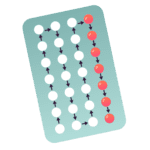DETAILS: The oral contraceptive pill (also called “the Pill”) contains hormones that prevent pregnancy and is taken once a day. The hormones in the Pill prevent pregnancy by stopping the release of an egg from your ovary (ovulation), thickening the mucus in your cervix to stop the sperm from entering your uterus, as well as thinning the lining of your uterus so it is less likely that a fertilised egg will attach. There are two types of contraceptive pills, both of which contain hormones that prevent pregnancy. Combination pills contain the hormones oestrogen and progestin. Progestin-only pills are called “the minipill” and may be suitable for women who are breastfeeding or who have a history of blood clots and strokes and should not take oestrogen. The Pill should be taken at the same time every day, regardless of whether you have had sex or not. If taken correctly, the Pill is very effective in preventing pregnancy. HOW TO: Ask your healthcare provider if the combined pill is the right contraceptive method for you. Your healthcare provider will also explain how and when to start taking the Pill, as this depends on the type you use. For the Pill to be effective, it has to be taken at the same time every day. Missing a pill increases your chances of becoming pregnant. Some women find taking the pill at the same time as a daily routine, such as brushing their teeth, helps them to remember. If you do miss a Pill, make sure to read the Patient Information Leaflet that comes in the box with your Pill to find out when to take your next Pill. If you are in doubt or have any questions, speak to your healthcare provider. You may experience: These changes in bleeding are normal and are not harmful. If you find them bothersome, speak to your healthcare professional. Details / How to
Pros / Cons
Frequently Asked Questions
PROS:
CONS:
SIDE EFFECTS:
This website uses cookies to improve your web experience.




